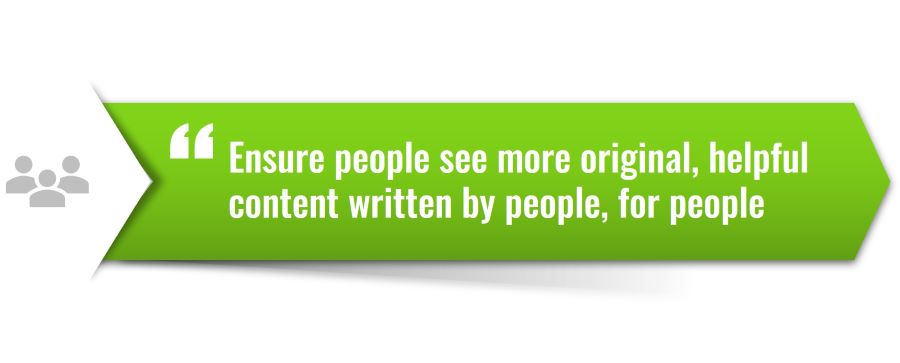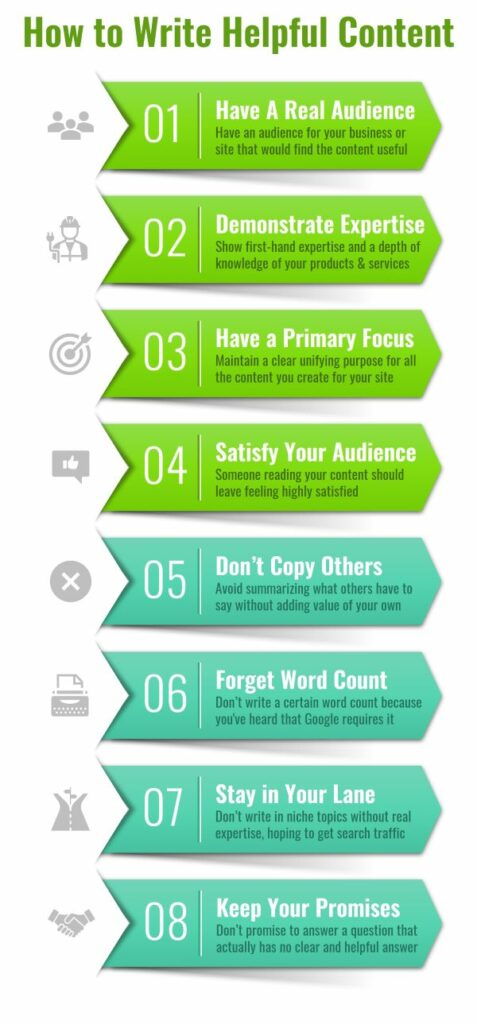In 2022 Google made several algorithm changes with how it ranks websites in search results. Their latest big adjustment, called “The Helpful Content Update”, sends a clear signal for what will affect rankings in 2023 and beyond.
Having your website rank highly in Google can have a significant impact on your business. However, what is required to get a website ranked well is constantly adjusting. The Search Engine Optimisation (SEO) techniques from 10 years ago certainly don’t work today. The latest changes from Google show that SEO strategies need to continue to evolve.
The Helpful Content Update
Google’s algorithm changes have the aim of better understanding people’s search queries and then making the search results more relevant and helpful.
With the “Helpful Content Update” their goal was to, “ensure people see more original, helpful content written by people, for people, in search results.”

Sounds fantastic, but what did it mean for the average sparky or plumber trying to grow a profitable business?
A simple explanation is that Google wants to see content on your site that answers the questions your customers are often asking – and to do it in the most accurate and informative way possible.
Think of the kind of answers you give to people when you’re on the phone with them or standing on their porch giving them a quote for work. That’s the content Google is keen to show in their search results.
Accordingly, they tweaked their algorithm to start rewarding businesses who clearly demonstrated that they are trustworthy experts with well-established authority in their field.
What happened as a result?
For many businesses, not much at all.
Google’s 2022 updates appear to be taking a long-term view. If you were already publishing content in which you had clear expertise that related to search queries, you’re in a good space. Your rankings are likely to have improved a little.
But many businesses who were trying to rank high in Google by paying for backlinks through overseas agencies felt the hammer come down. This is because most paid link-building schemes use lots of short articles that don’t really say much. In other words, they aren’t very helpful. And having an SEO strategy that doesn’t include content on your site is not going to work well going forward.
Some backlink providers don’t even try to add content. More than one link-building scheme that we’ve come across consists simply of a long list of businesses who all paid USD$100 for 50 backlinks. Google frowns on schemes like this that attempt to game their algorithm.

So, Google was cleaning house and removing the junk.
Where did that leave small business in New Zealand?
By people, for people
Google’s stated goal was to, “ensure people see more original, helpful content written by people, for people, in search results.”
The key here is not to try and improve your ranking by tricking Googles search bots, but to simply write real content about real questions for real people.
When creating content for your site, Google suggests you ask yourself a few questions:
- Do you have an existing or intended audience for your business or site that would find the content useful if it came directly from you?
- Does your content clearly demonstrate first-hand expertise and a depth of knowledge (for example, expertise that comes from having actually used a product or service, or visiting a place)?
- After reading your content, will someone leave feeling they’ve learned enough about a topic to help achieve their goal?
If your team or SEO agency is already doing this, you don’t need to worry too much – carry on. But if your SEO strategy doesn’t include content, it’s time to revisit it.
Go the extra mile
How original does it have to be? Most blogs out there say more or less the same thing as their competitors. Every plumber has a blog about how to choose a plumber, when to call an emergency plumber, and how to unclog a drain.
You can do better.
Our advice would be to write articles that stand out from the rest:
- Make sure your content adds value to your readers – you want them to leave satisfied.
- Add something unique to your content that differentiates you from your competitors and makes your offering more compelling – make them want to call you.
- Tell stories of people you have helped to clearly demonstrates that your products or services are awesome – so they see you as the expert who can help them.

Understand the intersection of their why and your why
It’s not hard to discover what people are searching for in your field. But one key to helpful content is to understand why they are searching. And then find where that intersects with why you want people to visit your site.
- Are they doing research about a product and want to know the pros and cons?
- Do they want to know which brand is the most affordable, or has the best performance, or looks the nicest?
- Perhaps they are simply looking to see who offers the best deal on a product they have already decided to purchase.
- Or do they want to make a connection with someone they feel they can trust?
Write content that addresses their what and their why, and be sure to remember your why in the process. It’s not just about getting traffic to your site; it’s about turning that traffic into potential customers. So, identify how the content you’re writing answers genuine questions for people and how this can be connected to them becoming a customer. If you forget this step, you could write a lot of content that gets a decent amount of traffic, but doesn’t produce any new customers.
Crafting a content strategy
Writing helpful content isn’t everyone’s cup of tea. For many marketing managers and business owners, taking time to write detailed content will draw you away from where you are most needed in the business. But this doesn’t mean you need to give up on having strong Google rankings. Just make sure that the staff or SEO agency assigned to the work has an intentional plan for developing clear and helpful content on your site.
If you would like help getting your website ranking higher in Google, talk to us about how our SEO team can help.









